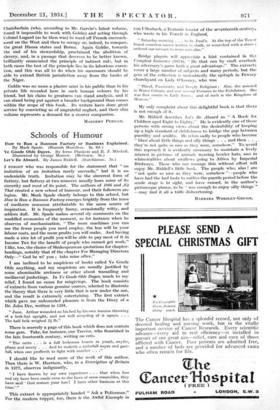Schools of Humour
How to Run a Bassoon Factory or Business Explained. By Mark Spade. (Hamish Hamilton. 3s. 6d.) Ye Goode Olde Dayes. By lame Plunkett and R. J. Mitchell. Illustrated by George Morrow. (Methuen. 5s.) Let's Be Absurd. By James Riddell. (Hutchinson. 5s.)
I FORGET who was responsible for the statement that " an imitation of an imitation rarely succeeds," but it is an undeniable truth. Imitation may be the sincerest form of flattery, but flattery at two removes usually loses some of its sincerity and most of its point. The authors of 1066 and All That created a new school of humour, and their followers are legion. Mr. Mark Spade clearly belongs to this school, but How to Run a Bassoon Factory emerges brightly from the mass of medidere nonsense attributable to the same source of inspiration. It is frequently funny, occasionally witty, and seldom dull. Mr. Spade makes several sly-comments on the muddled economics of the moment, as for instance when he observes of mechanization, " The more machines you can use the fewer'people you need employ, the less will be your labour costs, and the more profits you will make. And having made a nice lot of profit you will be able to pay most of it in Income Tair for the benefit of people who cannot get work." I like, too, the choice of Shakespearean quotations for chapter- headings, notably that df the chapter For Managing Directors Only—" God be wi' you ; take mine office."
I am inclined to be suspicious of books called Ye Goode Olde anything, and my suspicions are usually justified by some abominable archness or other about wassailing and mediaeval junketings. In Ye Goode Olds Dayes; much to my relief, I found no cause for misgivings. The book consists of extracts from various genuine sources, selected to illustrate the theory that there is very little that is new under the sun, and the result is extremely entertaining. The first extract which gave me unbounded pleasure is from the Diary of a Dr. John Dee, written in 1591.
" June. Arthur wounded on his hed by his own wanton throwing of a brik-bat upright, and not well avoyding of it agayn. . . The half brik weighed 24 lb."
There is scarcely a page of this book which does not contain some gem. Take, for instance, one Trevisa, who flourished in the late fourteenth century, writing on cats.
" The catte . . . is a full lecherous beaste in youth, swyfte, pliant and merry . . . And he maketh a ruthefull noyie and gast- full, when one proffreth to fight with another . . ."
I should like to read more of the work of this author. Then there is W. Harrison, who, in a Description of Britain in 1577, observes indignantly,
" I have known by my own experience . . . that when hue and cry have been made even to the faces of some constables, they have said ' God restore your loss ! I have other business at this "
This extract is appropriately headed " Ask a Policeman." For the modern tripper, too, there is the Awful Example in
von Uffenbach, a Teutonic tourist of the seventeenth century, who wrote in his Travels in England, " Saturday morning . . . to St. Paul's. At the top of the Tower found countless names written in chalk, or scratched with a atone : ordered our servant to write ours also."
Bridge players will appreciate a hint contained in thz. Compleat Gamester (1674), ' He that can by craft overlook his adversary's game hunt a great advantage." The extracts cover a large number of subjects and many periods, but the gem of the collection is undoubtedly the epitaph in Pewsey churchyard on Lady (Mooney, who was
" Bland, Passionate, and Deeply Religious ; Also, she painted in Water Colours, and sent. several Pictures to the Exhibition. She was first cousin to Lady Jones ; and of such is the Kingdom of Heaven."
My only complaint about this delightfid book is that there is not enough of it.
Mr. Riddell describes Let's Be Absurd as " A Book fot Children aged Eight to Eighty." He is evidently one of those persons with strong views about the desirability of keeping up a high standard of childishness to bridge the gap between puerility and senility. lie refers sadly to people who become " blasé about little things and silly things . . • and then . . they're not quite so nice as they were, somehow." To avoid this reproach it is evidently necessary to maintain a lively interest in pictures of animals wearing bowler hats, and in whimsicalities about swallows going to Africa by Imperial Birdways. Those who can manage this without effort will enjoy Mr. Riddell's little book. The people who, alas 1 are " not quite so nice as they were, somehow "—people who have had the bad taste to outlive the puerile period before the senile stage is in sight, and have ceased, in the author's picturesque phrase, to be " wee enough to enjoy silly things " —may find it all a trifle disheartening.
BARBARA WORSLEY-GOUGU.


































 Previous page
Previous page